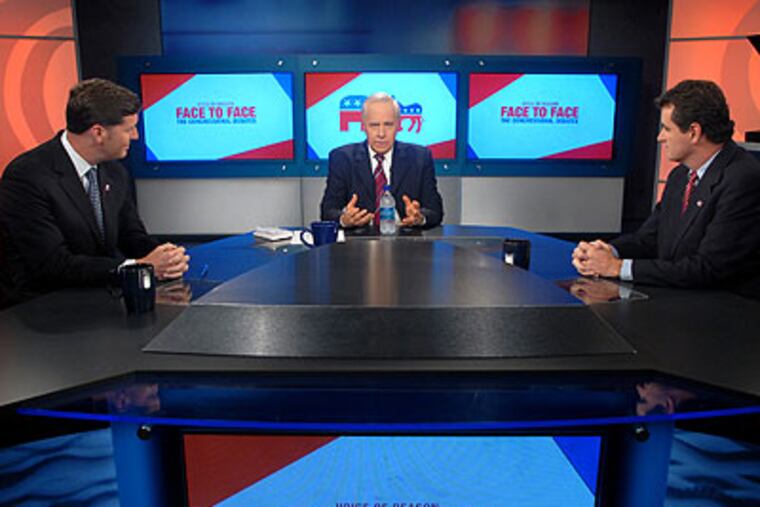Murphy, Fitzpatrick face off in Eighth Congressional District debate
Sign-waving partisans lined the street leading to the Bucks County synagogue where the debate would take place. Inside, the congressional candidates ascended the stage to rock-star cheers and chants of their names.

Sign-waving partisans lined the street leading to the Bucks County synagogue where the debate would take place.
Inside, the congressional candidates ascended the stage to rock-star cheers and chants of their names.
And once the debate began, it was interrupted repeatedly by hoots, applause, and boos from the 600-member audience, despite constant chiding by the peacekeeping forces - better known as the League of Women Voters.
"This is a rowdy audience," remarked the league's Judy Bender, moderator of the first open-to-the-public debate between U.S. Rep. Patrick Murphy and Republican challenger Mike Fitzpatrick in the Eighth District congressional race.
"They're getting ready for Donovan McNabb," quipped Murphy.
If nothing else, the pep-rally atmosphere of Sunday's debate at Congregation Shir Ami in Newtown underscored the high emotions attending what has been cast as a high-stakes, nationally watched test of this year's Republican push.
Murphy and Fitzpatrick first faced off in 2006, when Murphy unseated the Republican freshman by a fraction of a percent. Their first debate was last month, but it was a controlled, TV taping for Larry Kane's Voice of Reason program on the Comcast network.
For all of the hubbub, Sunday's hour-plus sequel yielded few new zingers and broke little new ground. If victory in such events means avoiding major missteps, both candidates prevailed.
Asked what the three top concerns of this campaign are, Murphy responded: "Jobs, jobs, jobs." As he has repeatedly, Murphy hammered Fitzpatrick for contributing to "the worst recession since the Great Depression."
"My opponent had his chance," Murphy said. "But when he was in Congress, he gave his vote to the Bush administration and to Wall Street."
Fitzpatrick fired back, saying that unemployment has doubled since Murphy took office, while deficits have deepened and bailout programs and health-care reform have not sat well with Americans.
Fitzpatrick also slammed Congress for putting off a vote on extending the Bush administration's tax cuts until after the November election. He favors extending all of the cuts, and he said the uncertainty will destroy the confidence business owners need to ease unemployment.
"Businesspeople will tell you that they need certainty in order to create jobs," Fitzpatrick said. Failing to vote on extending the Bush cuts, he said, "is the worst thing they could have done. As a result, there will be no jobs created in the next three months."
Murphy, who opposes continued cuts for individuals earning more than $200,000, said he opposed delaying the vote. He said he brought 3,000 new jobs to Bucks County through tax incentives and other measures, and said Fitzpatrick had no room to talk after voting for legislation that he said sent jobs overseas.
"That's like an arsonist complaining about the fire department's response time," Murphy said.
The candidates jousted again on health-care reform: Murphy called it necessary and budget neutral; Fitzpatrick called it a disguised tax bill deserving of appeal.
And they reaffirmed their support of military action, if necessary, to keep Iran from obtaining nuclear weapons.
Fitzpatrick, who has led in recent polls but has far less money on hand for advertising down the stretch, renewed his challenge to Murphy that they limit spending to $1 million.
"He called it a gimmick. He didn't want to do it," Fitzpatrick said. "He will spend millions and millions of dollars raised from outside this state to try to influence this election."
Murphy, an Iraq war veteran, countered that it "is pretty rich for someone who spent millions attacking my military service in 2006 to try to put limits on now. That's why people hate politics."
At least four more debates are planned before the Nov. 2 election.